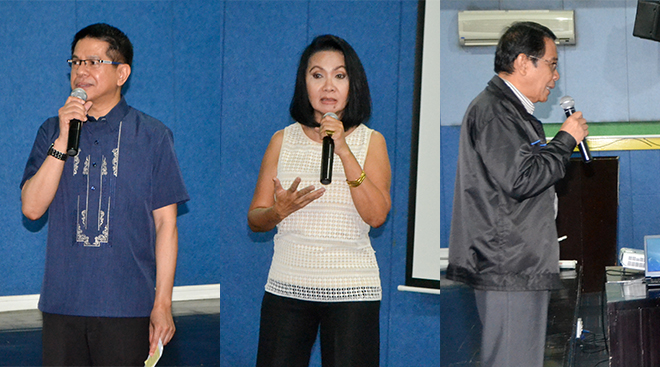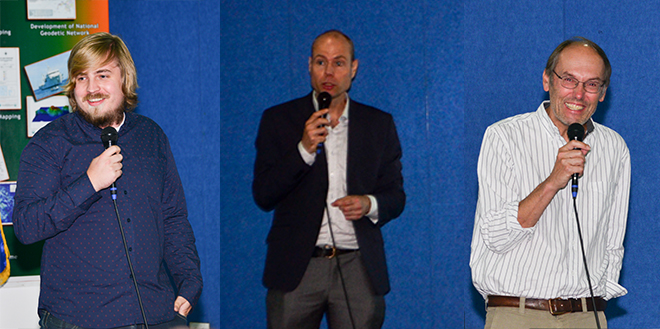The National Mapping and Resource Information Authority (NAMRIA), through the Resource Data Analysis Branch (RDAB), conducted a five-day training workshop on Radar Remote Sensing for the Development of National Ecosystem Accounting and Account Extent Map at the NAMRIA Lecture Hall, Fort Bonifacio, Taguig City on 17-21 October 2016. This was made possible through the collaboration of the World Bank representative to the Philippines with the Wealth Accounting and the Valuation of Ecosystem Services (*WAVES), SARVision, Department of Environment and Natural Resources (DENR), and NAMRIA.
Deputy Administrator (DA) Efren P. Carandang, in his opening remarks, cited that the roles of every contributing member agency with their inputs will be discussed in the training program. Former DENR Secretary Ms. Elisea G. Gozun, now World Bank consultant, Ms. Maya Gabriela Q. Villaluz (World Bank regional staff), Ms. Gemma B. Castillo (World Bank local consultant), and DENR OIC-Overall Director Edwin G. Domingo, all prominent individuals in their respective fields, were present in the event.
(Left) DA Carandang giving his message during the opening ceremony of the training program;
(Center) Former DENR Secretary and current World Bank consultant Ms. Gozun
giving her special message during the opening ceremony of the training program ;
(Right) DENR OIC-Overall Director Domingo as he delivers the opening remarks on day 1 of the training program -- JOSEPH C. ESTRELLA
During the workshop, Ms. Rosario B. Mamuric from the Land Resource Data Analysis Division of the RDAB talked about the WAVES project in the Philippines. Three experts, Dr. Lars Hein, Mr. Dirk Hoekman and Mr. Boris Kooij gave presentations. Dr. Hein, an Ecosystem Accounting Specialist from the Wageningen University and Research from the Netherlands, gave an overview on ecosystem accounting in the Philippines; correlation of radar, remote sensing and integrated concepts of ecosystem accounting; natural capital accounting; information of ecosystem in relation to calculating Gross Domestic Product of the Philippines; and, analyzing the flows of ecosystem services with the use of radar and remote sensing.
Mr. Hoekman, a radar expert from the SARVision, discussed about introduction to radar/remote sensing; basics of radar imaging and physical interaction; overview of current radar systems; and, statistics and filtering. Mr. Boris Kooij, also from the SARVision and a remote sensing expert, introduced Quantum Geographic Information System or QGIS - an open source GIS software that is useful in producing outputs such as land cover and other thematic maps.
(Left) Mr. Kooij giving instructions for the hands-on exercise;
(Center) Dr. Heins presenting the overview on the application of remote sensing and radar for ecosystem accounting;
(Right) Mr. Hoekman conducting his lecture on radar remote sensing and its applications
During the open forum, DA Carandang suggested that activites like this should be considered and included in the Philippine Development Plan for budgetary purposes. RDAB Director, Rijaldia N. Santos, Ph.D., thanked the guest lecturers for their worthy contributions in regards to their knowledge and skills shared to the participants. She also thanked all the participating agencies and added that she is looking forward to more collaborations with them.
Awarding of certificates on the last training day
RDAB Director, Dr. Santos as she delivers the closing remarks
*WAVES is a World Bank-led global partnership that aims to promote sustainable development by ensuring that natural resources are mainstreamed in development planning and national economic accounts. Its objectives are; (1) to help countries adopt and implement accounts that are relevant for policies and compile a body of experience, (2) Develop approaches to ecosystem accounting methodology, (3) establish a global platform for training and knowledge sharing, (4) build international consensus and natural capital accounting. The WAVES in the Philippines or the PHIL-WAVES, as the result of policy analysis and recommendations, provided a solid understanding on how the government can address competing claims on the country’s natural resources and the result of the ongoing environmental accounting will inform government strategies being considered in the next PDP. (source: www.wavespartnership.org)
Readers can email
newscoop@namria.gov.ph or fax letters to +63-2 8884-2855 for their comments and suggestions.




